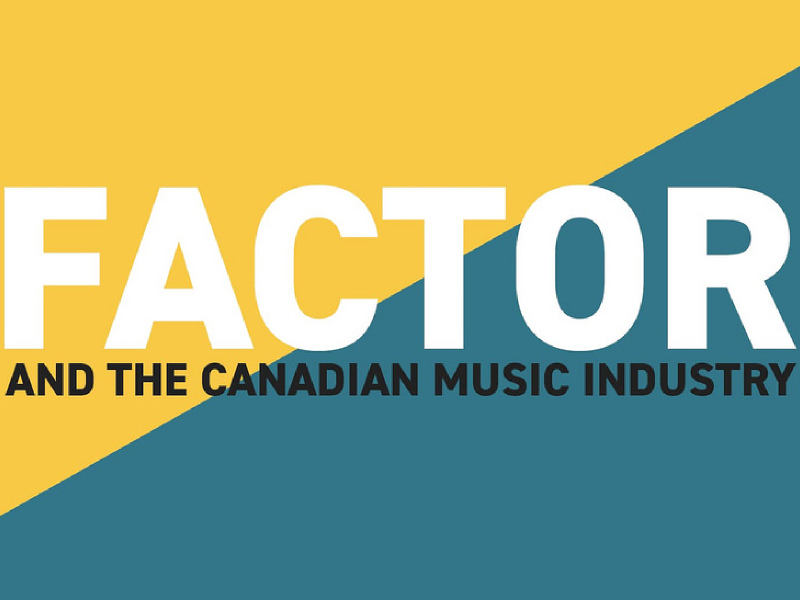|
Interview By Aaron Zaretsky Transcribed By Preeya Narcis It’s no secret that successfully having a big break in the music industry is one of the hardest things to achieve. Whether it's not having the connections you need to help get your name out there, or not knowing where to start, there is a program that can help emerging artists: FACTOR (Foundation Assisting Canadian Talent on Recordings) In this Northern Touch interview, VIBE105 Correspondent Aaron Zaretsky speaks with Karina Moldovan - Communications and Stakeholders Relations Officer at FACTOR. We discuss what exactly FACTOR offers Canadian artists, the types of programs, what steps you can take to get closer to your goal, and how you can participate in the FACTOR program. © FACTOR Canada Aaron: What is FACTOR’s role in the Canadian music industry? Karina: Generally, FACTOR provides funding primarily for Canadian artists, but also for Canadian record labels, artists managers, publishers, and distributors. We tend to fund a lot of events and conferences around the country as well. Through the funding we receive from the government of Canada and private radio broadcasters, we generally pay out about $20 million a year through grants, through these various programs that we have. Aaron: FACTOR’s role is a lever through various programs. What are FACTOR’s most popular programs? Karina: The two that are open to anyone to apply to at any time, are two jury programs. They're called Artist Development and Juried Sound Recording. We have three deadlines for those a year. The Artist Development program is a $2000 grant that can be used for pretty much anything that you want. It used to be called the demo program a few years ago, and was only $1500 but it was limited to having to create a demo recording. Whereas now a lot of people maybe find that's not where they want to start out, or it’s not really something they need at the moment. We’ve opened it up so if you want to make a video or you want to market a single that you have already created, we give you that $2000 to do just that. For the other program, the Juried Sound Recording program, to get that grant you should have a project that is focused on creating a full-length sound recording. To us, this means it should be at least six songs or 20 minutes in length. You also have access to extra money on top of that, to support that sound recording release. So if you do receive that grant you kind of have little envelopes of money earmarked for you for marketing and promotion, video production and showcase and tour support to obviously take that album you just made on the road or to have supporting materials created for it. On the higher end, the amount you can access for that is just under $50,000 which is assuming you’re also touring outside of Canada and you're doing some international dates something like that. But generally, that is a lot more money than Artist Development of course, so it depends what your goal is for that year. Aaron: For that $50,000 would you have to already be in the music industry? Karina: No, not necessarily. There’s no prerequisite for applying for that. If you have a band and you want to make an album, there’s nothing stopping you from applying to it. It’s definitely a very competitive program so the chances of you getting it on the first try are, I don't want to say slim, but it is very competitive and a lot of people do apply to it. But as long as you have good music and a really well thought out marketing plan, there’s no reason you wouldn't be able to get it. Aaron: In order to receive funds one must fill out an application. How long does the application process take? Karina: It does depend. The actual process of being online and filling out the application shouldn’t take too long if you already have a plan in place. We do encourage people to prepare their materials ahead of time, so once you get to the website, and you’re in your portal and are filling all of that in, you’re really just uploading and filling out information you already have and know. For example, for the Juried Sound Recording program you need to include a full marketing plan, which can take some time to put together, but ideally that would all be ready to go well ahead of time. It just depends on how organized you are, but definitely don’t do it the day of or the day before. Give yourself some time to go online and see what you need first, and then go back, put all that stuff together and then come back and upload it. Especially, if you have questions, you want to leave yourself some time to call us. Maybe you come across something you’re not really sure of or what it means, you’re not sure what we’re asking from you. You want to be able to reach us, get the answer and not have to rush at the very end. Aaron: So, if I’m a singer-songwriter who already has a track or album written, now looking for a space to record. I talk to FACTOR representative, what happens next? Karina: In terms of recording the album, we don’t really help you with any of that. It really just is a grant. If you’re looking for some space to record, that’s not necessarily something you’ll get from us. Let’s say you have things written, you would apply and hope you’re getting the grant. You also can also start recording and doing all of that stuff before you find out if you are successful or not. It just means if you’re not successful you’re paying out of pocket. But if you are you can backdate those costs, as long as they are after the date of application. That’s kind of it. Once you're ready to do that, you apply and hope for the best. It depends on what your financial situation is, you can either wait to find out or you can just start anyways if you’re going to do the project, regardless of funding. You might as well just get started. Aaron: If a person is aspiring to go into the music industry and apply, would they be able to receive funding? Karina: It depends what they want to do. If we’re talking about an artist, you can apply to either of those programs I mentioned, with no previous experience. You don’t have to have had an album before. If you’re trying to get into something else, like an artist manager or opening your own label, then the rules regarding getting funding for business development or for your artist or your label are a bit more detailed. You do need to have an actual business, have been in business for two years, and have a certain amount of qualified releases in a year. If you are right at the beginning, and you’re not an artist, you definitely need to work on that on your own a little bit and build that up. But if you are an artist then you definitely can get funding right away. “If we're talking about an artist, you can apply to either of those programs, with no previous experience, you don’t have to have had an album before.” Aaron: For the funding is it kind of like a loan where you get money at the beginning and then slowly have to pay it back? Karina: No. We used to have loan repayments, but we haven’t had those for the past two years now. You’re not paying anything back. But you do have to have some out-of-pocket cost because we only cover 75%. For example, the Artist Development program I talked about, that's the $2000 grant. That’s a maximum $2000. In order to get the full amount, you need to spend $2667, for that $2000 to make up 75%. You do have to put some of your own money in to get the full amount. If you spend less than that, it’s not a big deal, but you will not get the full $2000 from us. So there is some commitment from you as well, but you don’t have to pay anything back. © FACTOR Canada Aaron: Can you elaborate on what an Artist 3 rating is? Karina: I’ll go over what those ratings mean. Once you first enter into the system and you make your profile, you automatically get a General rating. Having a General rating means you can apply to the two programs, as well as showcase. If you are looking to access more money or higher up programs, you are going to want to try to reach the status of Artist 2 or Artist 3, which can happen twice a year where you can move up in ratings. The only benefit there is that you can still apply to Juried Sound Recording for example, but instead of $50,000 it’s $60,000 or $70,000, so it’s more money available. But there are no terms of being signed or unsigned, it does not matter whatsoever. You can be unsigned forever and be an Artist 3 and access all of that money, it doesn’t make a difference to us. Aaron: Is Artist 3 the highest? Karina: Yes, we have the smallest amount of artists in that category. Generally, it’s like 95%, or more, of all of the artists in our system which are General artists. The higher spots that are reserved for Artist 2 and 3 are pretty minimal, and you have to be reaching fairly significant sales and streaming numbers. Aaron: What is FACTOR’s biggest challenge? Karina: We are a national organization which means we provide funding to all of Canada, and artists all across Canada. We obviously only have a physical office and presence in Toronto, so that makes it a little more challenging to reach out to all of the communities that do require our help and assistance. We have provincial and territorial music industry associations. So every province and territory does have an office there, where they have their local music organization. We at FACTOR have REC - Regional Educational Coordinators, that work in those offices. Meaning, if you are out West somewhere you can go to Music BC and talk to somebody there and they can provide local and in person support on FACTOR programs, help answer questions. We make sure that they’re up-to-date with any changes or things that’s going on here, so that they can help the people we physically don’t get to see all the time. We are available via email and phone, but sometimes for that little extra help in-person it’s nice to be able to go in somewhere and talk to somebody about it. We meet once a year. For example, all of the education coordinator‘s in each of the provinces are met with to go over everything, and make sure that we’re providing the best support we can outside of Ontario, as well. Aaron: What are some tips on how to make a good application and some common errors to avoid? Karina: Let’s say you’re applying for Artist Development or Juried Sound Recording, meaning that your application is going to a jury of music industry professionals. It’s not me sitting here looking at your application and listening to your music, but it’s going to people who are currently active in the industry and can properly adjudicate your application. The most important thing is definitely your music and the marketing plan. They are the most heavily weighted, as well. For the music, make sure the recording you’re submitting is decent enough quality so they can accurately judge it. It doesn’t have to be professional, but they do need to be able to hear your voice clearly. If there are lyrics your singing, make sure you get your point across. For your marketing plan, the best tip there is that it’s specific and that the goals that you have are achievable and they make sense. I think it’s important to let the juror (the person who’s looking at your application) know that you are aware of what the industry is like, what your specific community within that genre is like, and that you have a realistic plan for the year. This is so you know how you’re going to explain how you want to use that money and what you’re going to do with it, and what goals you’re reaching and how. That’s going to be number one. Your music might be really good, but if your marketing plan doesn't make any sense and it doesn’t seem like it’s something that’s useable, then it’s going to be a little bit more difficult to get that grant. I think just keeping that in mind is really important. Aaron: That would be the criteria for the marketing plan? Karina: Yeah, and we do provide a template example of what kind of information should be included in your marketing plan, on our website. You can go off of that, and make sure © Calpurnia | YouTube Aaron: Is the marketing plan kind of like short-term goals, long-term goals? Karina: Yeah. You’re going to go over how you’re going to record, where and with who, and what your release strategy is and just general marketing plan stuff. It doesn’t have to cover where you want to be in 10 years, but what is your short-term term, medium-term plan for this specific project in general. Aaron: For those who have questions regarding FACTOR, such as the application process and its programs, or would simply like to learn more, how can they contact FACTOR? Karina: The best thing to do if you’re just starting out and you just have some basic general questions, is to call our main office line (1.877.696.2215) or email our general info inbox ([email protected]). That’s always a good place to get started. Once you’ve started the process of creating a profile and you have something in our system, you get assigned to a specific project coordinator. We have about seven or eight project coordinators here, and they each have a client list, like a roster of artists in the system that they are responsible for. So that’s going to be your main point of contact going forward, meaning when you call you know ‘Hey I’m going to talk to Steve and ask about my project’, and Steve will know all of the details because you’ve been talking to him for the past six months and he can kind of help you through things. At that point the best way to chat with us is to keep in contact with your project coordinator by phone and email, and maintain a relationship with them because it’s going to make a really big difference in your whole experience applying to us.
The FACTOR program is a great way to gain more experience as a new and upcoming artist. So start handing in those applications, and who knows maybe your song might be on radio! |
Recent PostsCategories
All
Archives
December 2021
|
|
GET THE APP!
Listen to VIBE 105 anywhere you go!
|
OUR STATION
|
TUNE IN RADIO
|
STAY CONNECTED
|
Copyright © 2021 Canadian Centre for Civic Media and Arts Development Inc. Except where otherwise noted, presentation of content on this site is protected by copyright law and redistribution without consent or written permission of the sponsor is strictly prohibited.






